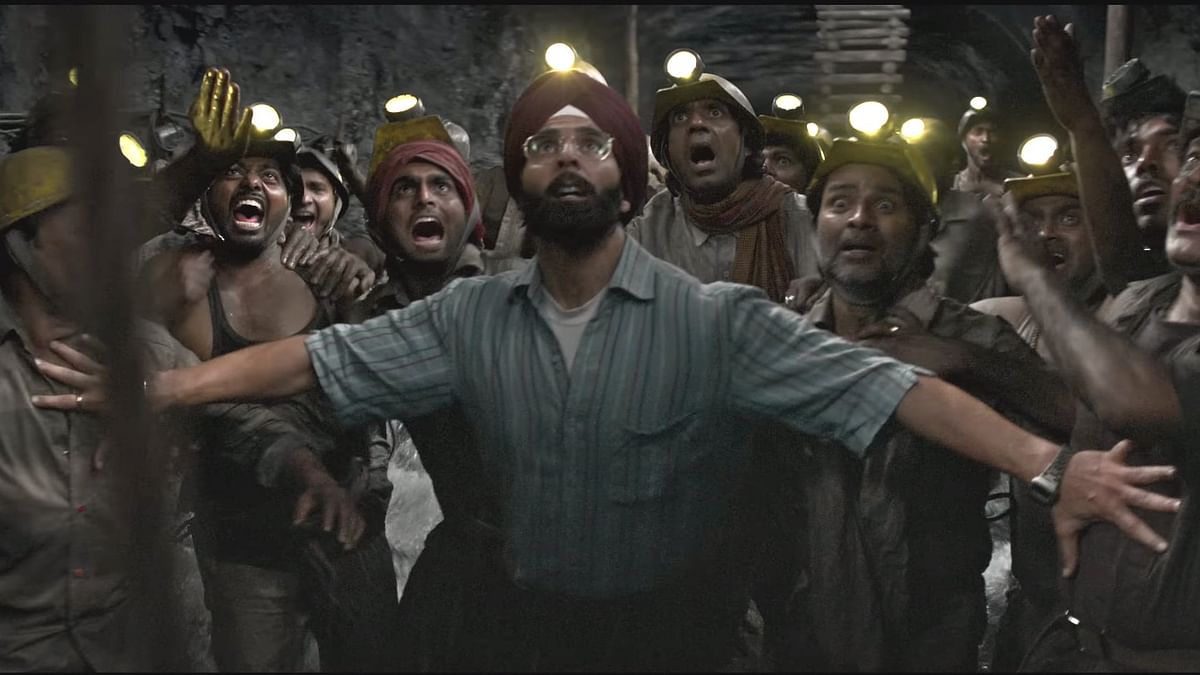Mission Raniganj Review:

In the vast landscape of Indian cinema, where true stories have been brought to life with resounding success, Mission Raniganj stands as an example of the genre’s pitfalls. Starring Akshay Kumar, a quintessential hero known for his fearless roles, this film seeks to retell the story of a mining disaster that unfolded in 1989. But does it manage to unearth the hidden gems of the true story, or does it remain buried under the weight of clichés and mediocre execution? In this extended exploration, we delve deep into Mission Raniganj to dissect its highs, lows, and everything in between.
1. The Trapped Miners: A Desperate Situation

Our journey begins in the heart of West Bengal’s Raniganj, where 65 miners find themselves in a nightmarish predicament, buried beneath layers of earth and despair. A mining disaster, triggered by a catastrophic watergate breach, has transformed their mundane workday into a desperate fight for survival. As they cling to hope, uncertain of whether they will ever see the light of day again, they become unwitting heroes in their own right, their resilience and endurance standing as a testament to the indomitable spirit of the human soul.
2. The Heroic Mission: Capsule Gill to the Rescue
In this dire moment, our protagonist, Jaswant Singh Gill, steps into the spotlight. Soon to be immortalized as ‘Capsule Gill,’ he emerges as the symbol of hope and determination that these trapped miners desperately need. His character, based on a real-life hero, embodies the essence of bravery and resourcefulness.
Jaswant Singh Gill’s mission is no ordinary task. It’s an audacious endeavor that would challenge the bravest of souls. His unwavering commitment to the cause, his determination to overcome insurmountable odds, and his ability to navigate the murky waters of politics make him a figure worth celebrating. Yet, as we journey deeper into the film, we begin to realize that the true potential of this heroic tale remains largely untapped.
3. The Downfall of Execution
3.1. Akshay Kumar’s Limited Efforts

As we examine the film’s execution, we must first turn our attention to its leading man, Akshay Kumar. Known for his versatility and charisma, Kumar has delivered memorable performances in a wide range of roles. However, in Mission Raniganj, his portrayal of Jaswant Singh Gill falls short of expectations. It feels as though Kumar is merely playing himself, relying on his signature style and mannerisms rather than fully immersing himself in the character. This lack of depth in his performance becomes a noticeable flaw in the film’s narrative.
3.2. The Not-So-Real Green Screen

One of the most striking shortcomings of Mission Raniganj is its visual effects and green screen scenes. These elements, which are crucial in bringing the underground world of the miners to life, unfortunately, fall flat. The boundary between the background and foreground is glaringly obvious, making it challenging for the audience to suspend disbelief and fully engage with the story.
3.3. Choppy Editing

Further compounding the film’s technical issues is the choppy editing in several scenes. It gives the impression that Akshay Kumar might have shot many of his scenes in isolation, with the director subsequently piecing them together using editing tricks. This disjointed approach to storytelling disrupts the overall flow of the narrative and diminishes the impact of crucial moments.
4. Wasted Talents: A Cast of Gems
One of the most disappointing aspects of Mission Raniganj is the underutilization of its talented ensemble cast. Dibyendu Bhattacharya, Kumud Mishra, Jameel Khan, Ravi Kishan, and Pavan Malhotra—each of these actors possesses remarkable skills that have been showcased in various films. However, in this particular endeavor, their talents are squandered. Their characters lack depth and development, leaving the audience yearning for more.
5. The Director’s Misstep: Tinu Suresh Desai

The director of a film plays a pivotal role in shaping its narrative and visual style. Tinu Suresh Desai, who previously surprised audiences with Rustom, fails to replicate his earlier success in Mission Raniganj. This raises questions about whether his earlier achievement was a fluke or if this film was directed by someone else entirely. The lack of cohesion and the film’s inability to capitalize on its potential suggest a significant misstep in the directorial process.
6. The Musical Misfire
A film’s music can be a powerful tool in enhancing its emotional impact and storytelling. Unfortunately, Mission Raniganj’s musical choices do not align with its potential. Despite having access to resources that could have elevated the soundtrack, the film falls short. The music, including the background score, fails to match the film’s dramatic intensity. This missed opportunity is evident in the film’s inability to create a lasting auditory impact.
Conclusion: A Missed Opportunity
In conclusion, Mission Raniganj is a film with a compelling true story at its core, but it falters in its execution. Despite the potential for greatness, it succumbs to clichés, lackluster characterizations, and technical shortcomings. Akshay Kumar’s portrayal, though charismatic, lacks the depth required to fully embody Jaswant Singh Gill. The film’s visual effects and editing issues further hinder its ability to captivate the audience.
Moreover, the ensemble cast, brimming with talent, is underused, leaving viewers craving more nuanced performances. Director Tinu Suresh Desai, who showed promise with Rustom, falls short in this venture, raising doubts about his directorial prowess.
The musical aspects of the film also miss the mark, failing to enhance the emotional resonance of the narrative. In the end, Mission Raniganj, despite its heroic source material, misses the opportunity to become a cinematic gem. It serves as a reminder that even the most captivating true stories can be undermined by lackluster execution. As we reflect on this film, we can’t help but wonder what could have been achieved with a more dedicated team and a deeper commitment to storytelling. Mission Raniganj leaves us with a lingering sense of unfulfilled potential, a missed opportunity in the world of Indian cinema.











